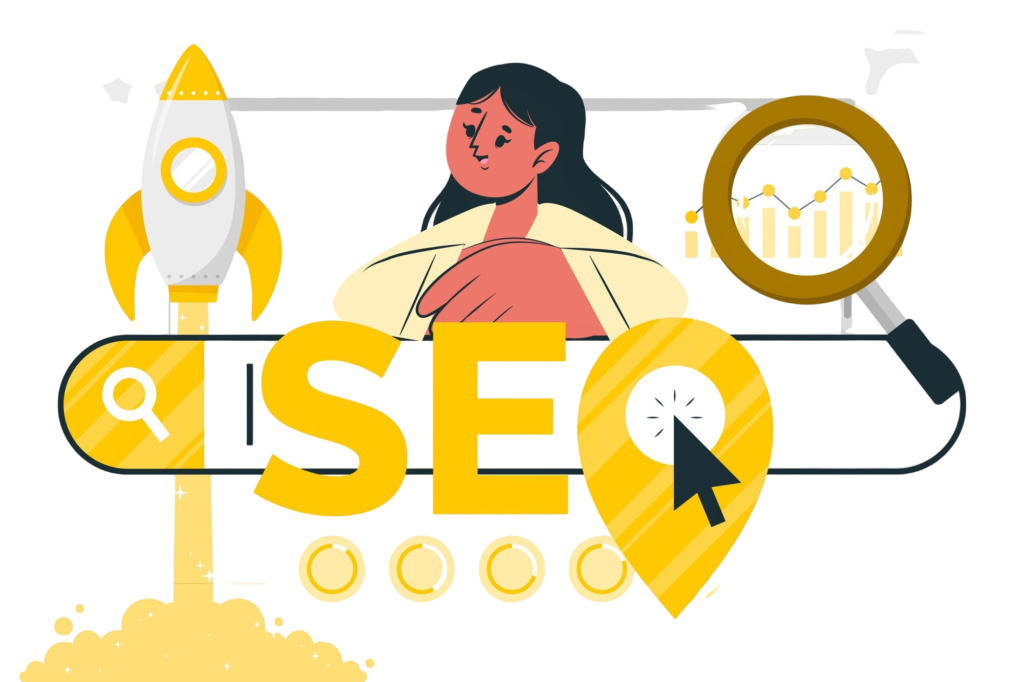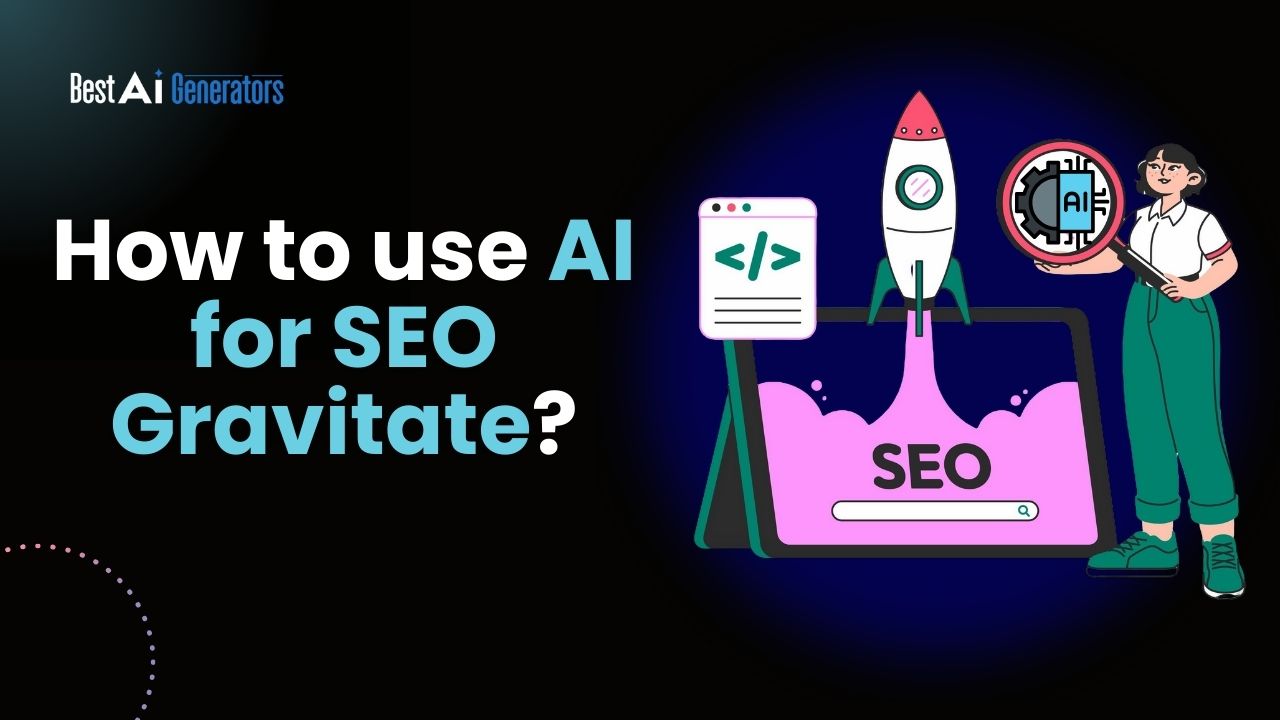The idea of utilizing artificial intelligence in search engine optimization is no longer just a futuristic vision; it has become a tangible reality that businesses of all sizes can harness to stay ahead of the competition.
AI-powered tools are revolutionizing the way we create content, analyze keywords, and predict user behavior, making SEO more precise and efficient than ever before. If you’re ready to set your course for success, this comprehensive guide will take you through the key ways you can leverage AI for SEO.
What is SEO Gravitate?
SEO Gravitate represents the strategic alignment of search engine optimization practices with the latest artificial intelligence (AI) advancements.

By “gravitating” towards AI-powered tools and techniques, businesses can seamlessly attract organic traffic, enhance user experiences, and stay competitive in a fast-evolving digital world. This concept emphasizes using AI as a tool and an integral part of an adaptive and forward-thinking SEO strategy.
1. Understanding AI’s Role in SEO
AI has become a vital tool in the SEO world, thanks to its ability to process vast amounts of data and identify patterns. This marks a shift away from traditional research methods, which often rely heavily on manual observation and guesswork.
Here’s how AI is transforming the field:
- Improved Keyword Research: AI tools analyze search trends and user intent, helping to pinpoint the most effective keywords.
- Content Optimization: AI algorithms offer valuable insights into readability, relevance, and structure, ensuring that content truly resonates with audiences.
- Predictive Analytics: By examining historical data, AI can forecast future trends, empowering businesses to stay ahead of the competition.
- User Behavior Analysis: AI tracks and interprets user interactions, allowing for fine-tuned SEO strategies that cater to audience preferences.
2. Leveraging AI-Powered Tools for Keyword Research
Keyword research is at the heart of every successful SEO campaign, and AI-powered tools are significantly speeding up the process while enhancing accuracy. Here’s how you can leverage AI in your keyword research strategy:
- Discover Long-Tail Keywords: With tools like Semrush and Ahrefs, you can uncover long-tail keywords that often fly under the radar but can tap into niche traffic effectively.
- Analyze Competitors’ Keywords: Tools such as SpyFu employ AI to examine the keyword strategies of your competitors, helping you stay one step ahead in the market.
- Understand Search Intent: AI can categorize keywords based on user intent—whether they are looking to buy, gather information, or compare options—enabling you to tailor your content more effectively.
3. Creating High-Quality, Optimized Content
Content remains paramount in the realm of SEO, and AI tools are revolutionizing the way we create and optimize it. Here’s how to harness AI for content creation effectively:
- Content Generation: Utilizing tools like ChatGPT and Jasper can help you brainstorm ideas on trending topics tailored to your audience’s interests.
- Readability: Tools such as Grammarly and Hemingway Editor go through your content, ensuring it’s polished in terms of grammar, clarity, and tone, making it resonate with your target readers.
- SEO Optimization: With AI tools like Surfer SEO and Clearscope, you’ll receive recommendations on keyword placement, crafting meta descriptions, and determining the ideal length of your content to boost its search rankings.
- Automate Content: While the human touch is crucial for creativity, AI can enhance the process by generating fully drafted pieces, concise summaries, or even comprehensive stories, which significantly speed up production.
4. Applying AI for Better On-Page SEO
On-page SEO focuses on optimizing your website for both search engines and users, and harnessing the power of AI can make this process more manageable.
- Meta Tag Optimization: With the help of AI tools, you can easily generate engaging meta titles and descriptions tailored to your chosen keywords.
- Improve Internal Linking: AI algorithms can offer suggestions for internal links, enhancing your website’s structure and helping users navigate more effectively.
- Analyze User Engagement: Tools such as Crazy Egg and Hotjar utilize AI to monitor user interactions, pinpointing areas where improvements can be made.
- Enhance Page Speed: AI-driven tools like NitroPack analyze your website’s performance and optimize it for faster loading times, ensuring a smoother user experience.
5. Leverage of AI for Technical SEO
Technical SEO focuses on optimizing your website’s infrastructure to enhance its crawlability and indexability. AI tools can efficiently tackle the complexities of technical SEO as follows:
- Crawl and Audit Websites: Tools like Screaming Frog and DeepCrawl leverage AI to pinpoint broken links, duplicate content, and various other issues.
- Fix Structured Data: AI technologies ensure that your site’s structured data aligns with search engine guidelines.
- Optimize Mobile Usability: AI evaluates your site’s mobile performance and suggests improvements to enhance user experience.
- Monitor Algorithm Changes: AI tools keep an eye on updates to Google algorithms, helping your site remain competitive and up to date.
6. Using AI to Improve User Experience (UX)
User experience plays a crucial role in reducing bounce rates and improving rankings. By leveraging AI, we can vastly enhance UX in several ways:
- Personalized Recommendations: Utilizing AI technologies like Dynamic Yield, we can analyze user behavior to deliver tailored content and product suggestions that resonate with individual preferences.
- Chatbots for Engagement: AI-driven chatbots provide users with immediate answers, enriching their experience and encouraging them to spend more time on the site.
- Heatmaps for Insights: AI-generated heatmaps reveal where users are clicking, allowing for more effective optimization of site design and layout to better meet user needs.
Incorporating these AI advancements can significantly boost overall user satisfaction and site performance.
7. Analyzing and Reporting SEO Performance
To effectively monitor your SEO efforts, it’s essential to evaluate their impact, and leveraging AI can enhance your reporting process.
- Comprehensive Dashboards: AI tools such as Google Analytics 4 and Tableau offer detailed, real-time insights into your website’s traffic, conversion rates, and user behavior.
- Predictive Analytics: These advanced systems can forecast trends and anticipated outcomes, enabling you to make proactive adjustments to your strategy.
- Automated Reporting: Streamline your workflow with AI-generated reports that summarize key performance metrics and provide actionable insights.
8. Staying Ahead with Predictive SEO
One of the most impressive abilities of AI lies in its predictive analytics, which enables businesses to forecast trends and adjust their strategies accordingly.
- Trend Analysis: AI tools can pinpoint emerging trends within your industry, allowing you to create content that taps into these developments.
- Future-Proof Strategies: By anticipating shifts in user behavior and changes in search engine algorithms, AI ensures that your SEO strategy remains resilient and avoids potential pitfalls.
9. Navigating Away from Pitfalls: Keeping That Human Touch
While AI is a valuable tool, it’s essential to balance its use with human creativity to prevent becoming too dependent on automation. Relying heavily on AI can result in several issues:
- Generic Content: Unlike human writers, AI-generated content often lacks the emotional nuance and authenticity that resonate with audiences.
- Over-Optimization: Excessively following AI suggestions or keyword usage can backfire and negatively impact your search rankings.
- Ethical Concerns: Maintaining transparency is crucial; always make it known when AI has played a role in creating your content.
10. The Future of AI in SEO
As AI technology continues to evolve, its influence on SEO is set to grow significantly. Here are some emerging trends to keep an eye on:
- Voice Search Optimization: AI tools are becoming essential for refining content to cater to voice search queries, which are rapidly gaining popularity.
- Visual Search: With the capabilities of AI, optimizing for image and video searches is becoming increasingly feasible, opening up exciting new traffic opportunities.
- Real-Time Adaptation: Advanced AI algorithms will allow SEO strategies to adjust in real-time, keeping pace with changes in search engine algorithms and shifts in user behavior.
Conclusion
AI is revolutionizing SEO, with unparalleled efficiency, precision, and insights. It is now possible for businesses to achieve sustainable growth and outpace the competition through the use of AI-powered tools in keyword research, content creation, technical SEO, and user experience. However, a human touch is necessary to maintain authenticity and engagement. Use AI as your partner in SEO, and your digital presence will gravitate toward success.

